UJI TOKSISITAS EKSTRAK DAN ISOLAT DAUN SRIKAYA (Annona squamosa Linn) DAN IDENTIFIKASI SENYAWANYA
Abstract
ABSTRAK: Srikaya (Annona squamosa Linn) merupakan tanaman yang mengandung banyak manfaat yaitu pencegahan penyakit jantung, mencegah penyakit asma, mengatasi penyakit diabetes, mengobati masalah hipertensi mencegah dan mengobati penyakit kanker. Penelitian ini dilakukan untuk mengetahui aktivitas toksik ekstrak dan isolat daun srikaya serta identifikasi kandungan senyawanya. Metode Brine Shrimp Mortality Test (BSLT) digunakan untuk uji toksisitas dan identifikasi senyawa dengan menggunakan instrumen LC MS/MS. Maserasi 750 g serbuk daun srikaya kering menggunakan pelarut metanol menghasilkan 64,45 g ekstrak kental. Uji toksisitas ekstrak kental metanol menunjukkan nilai LC50 sebesar 26,30 ppm. Partisi 45,0 g ekstrak kental metanol menghasilkan 14,3 g ekstrak n-heksana, 2,57 g kloroform dan 9,05 g n-butanol dengan nilai LC50 berturut-turut 104,71; 52,48; dan 323,59 ppm. Pemisahan senyawa pada ekstrak kloroform dilakukan dengan kromatografi kolom menghasilkan empat fraksi dengan fraksi A menunjukkan aktivitas paling toksik dengan nilai LC50 sebesar 100,00 ppm. Analisis LC MS/MS fraksi A menunjukkan adanya senyawa (6S,7?R)-6-hydroxy-4,4,7?-trimethyl-6,7-dihydro-5H-1-benzofuran-2-one (Loliolide); Cocamidopropyl betaine; Linolenic Acid; dan 1-Dodecyl-2-azepanon (Laurocapram).
ABSTRACT: Sugar apple (Annona squamosa Linn) has many benefits, i.e. preventing heart disease, preventing asthma, overcoming diabetes, treating hypertension problems, preventing and treating cancer. This research aims to find out the toxicity of sugar apple leaf extract and isolate and to identify their compounds. Brine Shrimp Mortality Test (BSLT) method was used for toxicity test and identification compounds carried out using the LC MS/MS instrument. Maceration of 750 g of dry sugar apple leaf powder using methanol as solvent yielded 64.45 g of thick extract. Toxicity test of methanol viscous extract showed an LC50 value of 26.30 ppm. Partition of 45.0 g of methanol thick extract produced 14.3 g of n-hexane extract, 2.57 g of chloroform and 9.05 g of n-butanol with LC50 values ??of 104.71; 52.48; and 323.59 ppm respectively. The separation of compounds in the chloroform extract was carried out by column chromatography resulting in four fractions with fraction A showing the highest toxicity with an LC50 value of 100.00 ppm. LC MS/MS analysis of fraction A showed the presence of compound (6S,7?R)-6-hydroxy-4,4,7?-trimethyl-6,7-dihydro-5H-1-benzofuran-2-one (Loliolide) ; Cocamidopropyl betaine; Linolenic Acid and 1-Dodecyl-2-azepanone (Laurocapram).
Downloads
References
[2] Love, R.R., Leventhal, H., Esaterling, D.V., dan Nerenz, D.R. 1989. Side Effects and Emotional During Cancer
Chemoteraphy. Jurnal Cancer 63(3): 12-604.
[3] Nurjanah, N., dan Ihsan, N., 2013, Ancaman dibalik Segarnya Buah dan Sayur, Pustaka Bunda. Jakarta..
[4] Tansil, Sukmawati, Mahmud Ghaznawie dan Gabriela Reginata. 2016. Deteksi Dini Karsinoma Sel Basal. Indonesian Journal of Cancer. 10 (2) : 61-66.
[5] Meyer, Laughlin, Ferrigini. 1982. “Brine Shrimp: Convenient General Bioassay for Active Constituent”. Planta Medica 45: 31 – 34.
[6] Colegate, S. M. and Molyneux, R. J. 1993. Bioactive Natural Products Detection : Isolation and Structural Determination. CRC Press, Inc. Boca Raton Florida. pp : 444-454.
[7] Susanti, F.E., P. Sugita., And L. Ambasari. 2016. Purification OfActive Compounds From Kecapi Leaves That Have Potential As Anticancer For In Vitro On Murine Cells Leukemia P-388. Int. J. Chem. Sci. 14(3): 1376-1384.



 Petunjuk Penulisan
Petunjuk Penulisan
